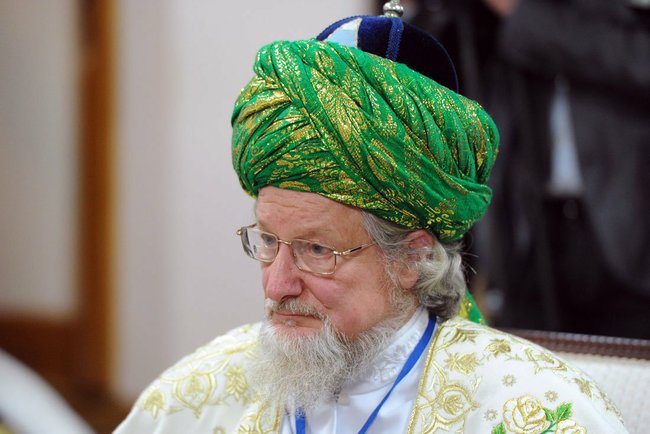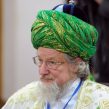
Mufti Tajuddin Seeks to Make Himself and Then His Son ‘Muslim Patriarch’ of Russia
Publication: Eurasia Daily Monitor Volume: 12 Issue: 89
By:

Many might dismiss the beating of a 57-year-old imam in rural Chuvashia (Regnum, May 7) as a minor local episode. But in fact, it threatens to open a dramatic, violent and potentially explosive new phase in efforts by Talgat Tajuddin, the last mufti in the Russian Federation appointed in Soviet times and head of the Central Muslim Spiritual Directorate (MSD) in Ufa, to form a single “power vertical” for the Muslim umma of that country, with himself as its head. This would turn Tajuddin into an Islamic counterpart to the Moscow patriarch in the Russian Orthodox Church.
Having lost power within the Muslim community since his appointment 25 years ago, Tajuddin, 66, who sometimes styles himself “the supreme mufti of Holy Rus,” has clearly changed his strategy in pursuit of that goal—one he has long had (for background, see Windowoneurasia.blogspot.com, October 23, 2007; December 11, 2009)—in three ways:
First, he has moved from his unsuccessful frontal attack on the other MSDs to a parish-by-parish campaign from below. Second, he has enlisted the help of the Russian government in Moscow against regional and republic administrations that typically support their own MSDs against any larger bodies. And third, he has now made clear that he wants his Central MSD to become like the Soviet-era MSD in Central Asia, where a single family—the Babakhanovs—controlled the leadership for more than 50 years.
But in each case, Tajuddin has faced serious resistance. The more than 80 regional and republic-based MSDs are quite prepared to fight back, playing on differences among the various Islamic traditions that have long kept the Russian umma divided. The regional governments are willing to support them against a single center lest they lose an important lever of social and political control. And many Muslims within Russia are horrified by the notion that their community might be governed in the way that the Babakhanovs ruled Islam in Central Asia from World War II to the end of Soviet times.
Consequently, even though Tajuddin may expect Kremlin support, the Ufa leader is likely to face a revolt as he proceeds in this way. His actions could end up destroying the entire MSD system, which has no canonical basis in Islam but is rather a Russian-Soviet-Russian administrative convenience (for background, see Windowoneurasia2.blogspot.com, December 9, 2014). And the elimination of the MSD system in Russia could, in turn, open the way to a more freewheeling umma, one over which Moscow would have even less control and in which radical trends, such as Wahhabism, could be expected to flourish.
Those are some of the conclusions that flow from the recent Chuvash case and thus make it worthy of close attention.
On April 21, the Central MSD reported, Rakhimulla Ibetov, the 57-year-old imam of the mosque in Dolgy Ostrov of the Baturyevsk district of Chuvashia, was beaten after ignoring threats to his person for trying to transfer his parish from the republic MSD to Tajuddin’s Central MSD. According to Ufa, Ibetov’s parishioners voted to make this change last August, but they were unable to realize their goals because the Chuvash republic’s justice ministry required that they obtain approval from the republic MSD first—something that the latter has not been prepared to give (Regnum, May 7).
Tajuddin’s organization appealed to the Chuvash authorities to reverse themselves, accusing the republic MSD of engaging in “splitting” and “destroying the unity of Muslims” by playing on divisions among the MSDs. Ufa chose Chuvashia to make its point for three reasons: first, the head of the Chuvash MSD is a former Tajuddin deputy who broke with the Ufa mufti and now works with the rival Council of Muftis of Russia (SMR); second, Chuvashia is a Christian Turkic republic in which fewer than one in ten in the population are Muslims, making it more likely that the republic government would sacrifice the local MSD; and third, the Moscow Patriarchate of the Russian Orthodox Church is concerned about the growth of the Muslim community there and very much prefers Tajuddin’s anti-missionary approach to Chuvash mufti Albir Krganov’s support for such outreach programs.
But Rais Suleymanov, a controversial specialist on Russian Islam at the Moscow Institute of National Strategy, told Regnum that there is an even more immediate personal element involved. The aging Tajuddin is worried, Suleymanov suggests, that Krganov plans to pursue the leadership of the Central MSD after Tajuddin passes from the scene, an entirely credible possibility given the support Krganov and the SMR have in many parts of the Middle Volga. Such a move by Krganov would undercut Tajuddin’s own plans to hand off power to his son, Mukhammad. Talgat Tajuddin has already set the precedent for doing so by organizing Babakhanov-style dynastic successions in the MSDs subordinate to him in Samara, St. Petersburg and Penza (Regnum, May 7).
Blocked by both Muslims and the civil authorities in Chuvashia from sacking Krganov, Tajuddin has decided to undermine him by working at the grass-roots-level with the Muslim parishes there. That has now led to violence, and more will be ahead if the Ufa mufti continues his campaign in Chuvashia and, as seems likely, extends it to other parts of the Russian umma as well.




